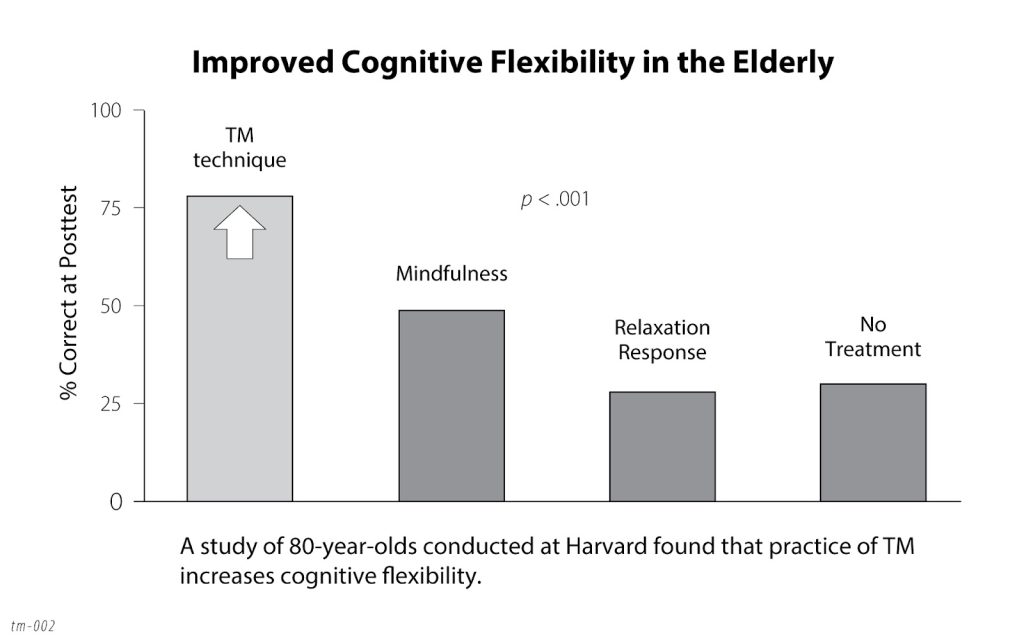Transcendental Meditation Improves Memory and Cognition

As our grandparents and then our parents get older, we may witness a decline in their cognitive abilities. A person fortunate enough to live a long life may remain sharp, but there is usually a decline in cognitive functioning in the elderly. It’s emotionally difficult to see your long-loved and long-respected elders become irrational or unreasonable or confused. It’s scary to acknowledge that it can happen to you.
Not to worry. There is at least one simple way to help yourself stay as clear as possible despite the relentless ascent into older age.
Scientific research shows that the Transcendental Meditation technique produces synchronous alpha waves in the prefrontal cortex that often spread throughout the entire brain. Studies also show that during the TM practice there is an increase of blood flow to the brain. These research findings indicate a style of more efficient, orderly brain functioning—the different parts of the brain are communicating and working together better as a whole.
Two-thirds of those who suffer from Alzheimer’s are women. By improving brain functioning daily, the TM technique supports vibrant alertness, focus, and comprehension throughout life, even as we age.

A research study published in 2005 in the Journal of Social Behavior and Personality of people between the ages of 60 and 74 found that those practicing the Transcendental Meditation technique had significantly higher levels of fluid reasoning, verbal intelligence, long-term memory, and speed of processing than those who didn’t learn TM.
The TM group also was found to have lower levels of the free radical lipid peroxide, which causes cell damage. The researchers found significant correlations between lipid peroxide levels and both reasoning ability and memory.
According to a study on lipid peroxidation quoted by the National Institutes of Health:
Increasing evidence suggests free radical mediated oxidation of biological substrates is a key feature of Alzheimer’s disease (AD) pathogenesis. While it has long been established that biomarkers of lipid peroxidation (LPO) are elevated in AD brain as well as ventricular CSF postmortem, more recent studies have demonstrated increased LPO biomarkers in postmortem brain from subjects with mild cognitive impairment (MCI), the earliest clinically detectable phase of dementia and preclinical AD (PCAD), the earliest detectable pathological phase. Furthermore, multiple LPO biomarkers are elevated in readily accessible biological fluids throughout disease progression. Collectively these studies demonstrate that LPO is an early feature during disease progression and may be considered a key pathway for targeted therapeutics as well as an enhancer of diagnostic accuracy for early detection of subjects during the prodromal phase.
Higher lipid peroxide levels are also a significant contributor to diseases such as cancer, autoimmune disorders, cataracts, rheumatoid arthritis, and cardiovascular and neurodegenerative diseases.
The 2005 study was titled Effect of the Transcendental Meditation Program on Intellectual Development in Community-Dwelling Older Adults. The findings illustrated that the TM technique produces holistic changes ranging from basic biochemical mechanisms that underlie good health to high levels of brain integration that are the foundation of human perception and reasoning.

Related research findings:
So K.T. and Orme-Johnson D.W. Three randomized experiments on the longitudinal effects of the Transcendental Meditation technique on cognition. Intelligence 29: 419-440, 2001.
Alexander C. N. and Gackenbach J. Transcendental Meditation and improved performance on intelligence-related measures: A longitudinal study. Personality and Individual Differences, 12, 1105–1116, 1991.
Aron A., et al. A 4-year longitudinal study of effects on cognitive and affective functioning. College Student Journal 15: 140-146, 1981.
Cranson R.W., et al. Transcendental Meditation and improved performance on intelligence-related measures: A longitudinal study. Personality and Individual Differences 12: 1105-1116, 1991.
Frontal EEG coherence, H-reflex recovery, concept learning, and the TM-Sidhi program. International Journal of Neuroscience 15: 151-157, 1981.
Meditation and flexibility of visual perception and verbal problem-solving. Memory & Cognition 10: 207-215, 1982.
Longitudinal effects of the Transcendental Meditation and TM-Sidhi program on cognitive ability and cognitive style. Perceptual and Motor Skills 62: 731-738, 1986.
Vedic Science based education and nonverbal intelligence: A preliminary longitudinal study in Cambodia. Higher Education Research and Development 15: 73-82, 1995.
Increased intelligence and reduced neuroticism through the Transcendental Meditation program. Gedrag: Tijdschrift voor Psychologie 3: 167-182, 1975.
Transcendental Meditation and improved performance on intelligence-related measures: A longitudinal study. Personality and Individual Differences 12: 1105-1116, 1991.
The TM-Sidhi programme, age, and brief test of perceptual-motor speed and nonverbal intelligence. Journal of Clinical Psychology 42: 161-164, 1986.
The TM-Sidhi programme, pure consciousness, creativity and intelligence. The Journal of Creative Behavior 19: 270-275, 1985.
The Transcendental Meditation technique and creativity: A longitudinal study of Cornell University undergraduates. Journal of Creative Behavior 13: 169-180, 1979.
Transcendental Meditation and developmental advancement: Mediating abilities and conservation performance. Dissertation Abstracts International 47(8): 3558B, 1987.
EVERY DAY COUNTS. CONTACT A CERTIFIED TM TEACHER TODAY
About the Author
Janet Hoffman is the executive director of TM for Women Professionals, a division of TM for Women in the USA
More Posts by Janet
- A Simple Guide to Healthy Happy Mothers and Babies: An Interview with Author Margaret Mullins
- Author Ann Purcell Discusses Silence
- Five Fundamentals of Progress: A Scientific Path to Self-Improvement
- Advice You Can Rely On: How to Leverage Your Body’s Innate Healing Ability
- Saving the Ocean from Deadly Noise Pollution: An Interview with Kathy Matara PhD





